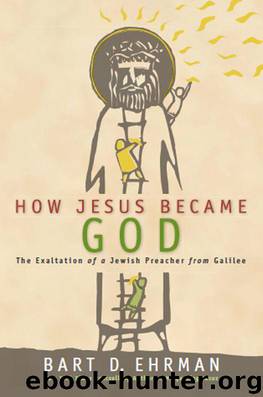How Jesus Became God: The Exaltation of a Jewish Preacher From Galilee by Bart D. Ehrman

Author:Bart D. Ehrman [Ehrman, Bart D.]
Language: eng
Format: epub, mobi
ISBN: 9780061778186
Amazon: 0061778184
Publisher: HarperOne
Published: 2014-03-25T00:00:00+00:00
The Outcome of Faith
EVEN THOUGH HISTORIANS CANNOT prove or disprove the historicity of Jesus’s resurrection, it is certain that some of the followers of Jesus came to believe in his resurrection. This is the turning point in Christology. Christology, as I have said, is a term that literally means the understanding of Christ. My point in this chapter—indeed, in this book—is that belief in the resurrection changed everything Christologically. Before the followers of Jesus believed in his resurrection, they thought he was a great teacher, an apocalyptic preacher, and, probably, the one chosen to be king in the coming kingdom of God. Since they followed him wholeheartedly, they must have subscribed to his teaching wholeheartedly. Like him, they thought the age they were living in was controlled by the forces of evil, but that God would soon intervene to make right all that was wrong. In the very near future, God was going to send a cosmic judge over the earth, the Son of Man, to destroy the wicked powers that were making life so miserable in this world and to set up a good kingdom, a utopian place where good would prevail and God would rule through his messiah. The disciples would sit on thrones as rulers in the coming kingdom, and Jesus would be seated on the greatest throne of all, as the messiah of God.
But he was purely human. He was a great teacher, yes. A charismatic preacher, yes. And even the son of David who would rule in the future kingdom, yes. But he was a man. Born like other humans, raised like other humans, in nature no different from others, only wiser, more spiritual, more insightful, more righteous, more godly. But not God—certainly not God, in any of the ancient senses of the term.
That all changed with the belief in the resurrection. When the disciples came to believe that God had raised Jesus from the dead, they did not think it was a resuscitation such as you can find elsewhere among the Jewish and Christian traditions. In the Hebrew Bible, Elijah was said to have brought a young man back from the dead (1 Kgs. 17:17–24). But that young man went on to live his life here on earth and then he died. Later there were stories about Jesus raising the daughter of Jairus from the dead (Mark 5:21–43). She did not ascend to heaven and become immortal: she grew up, grew old, and died. Jesus allegedly raised his friend Lazarus from the dead (John 11:1–44). He too eventually died. These were all instances of resuscitation, when the body came back from the dead in order to live and then die again. They were the ancient equivalents of near-death experiences.
But that is not what the disciples believed about Jesus. The reason is clear. They believed Jesus had come back from the dead—but he was not still living among them as one of them. He was nowhere to be found. He did not resume his teaching activities in the hills of Galilee.
Download
How Jesus Became God: The Exaltation of a Jewish Preacher From Galilee by Bart D. Ehrman.mobi
This site does not store any files on its server. We only index and link to content provided by other sites. Please contact the content providers to delete copyright contents if any and email us, we'll remove relevant links or contents immediately.
| Guides | New Testament |
| Old Testament |
The Five People You Meet in Heaven by Mitch Albom(3562)
The Secret Power of Speaking God's Word by Joyce Meyer(3184)
Real Sex by Lauren F. Winner(3016)
Name Book, The: Over 10,000 Names--Their Meanings, Origins, and Spiritual Significance by Astoria Dorothy(2982)
The Holy Spirit by Billy Graham(2944)
0041152001443424520 .pdf by Unknown(2843)
How The Mind Works by Steven Pinker(2813)
ESV Study Bible by Crossway(2774)
Ancient Worlds by Michael Scott(2682)
Churchill by Paul Johnson(2578)
The Meaning of the Library by unknow(2565)
The ESV Study Bible by Crossway Bibles(2550)
The Gnostic Gospels by Pagels Elaine(2527)
MOSES THE EGYPTIAN by Jan Assmann(2412)
Jesus by Paul Johnson(2352)
City of Stairs by Robert Jackson Bennett(2348)
The Complete Dead Sea Scrolls in English (7th Edition) (Penguin Classics) by Geza Vermes(2277)
The Nativity by Geza Vermes(2227)
Ancient Near Eastern Thought and the Old Testament by John H. Walton(2223)
